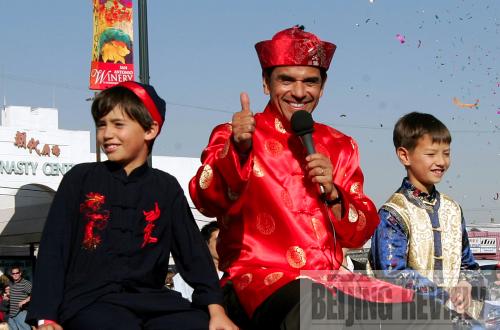|
 |
|
CHINESE CHIC: Los Angeles Mayor Antonio Villaraigosa takes part in the annual Golden Dragon Parade in Los Angeles on February 24, 2007 (ZHANG YUWEI) |
By signing into law a bill apologizing for historical discrimination against the Chinese-American community on July 21, California Governor Arnold Schwarzenegger took a bold step that will herald a new era, not just for Chinese Americans—but for Sino-U.S. relations as well. The legislation also recognizes the vital contributions Chinese immigrants have made to the Golden State.
Despite their reputation for being hardworking, kind-hearted and polite, the Chinese have been the only ethnic group to be systematically banned by the federal government from entering the United States in America's history. Even Japanese, German and Italian immigrants were not subject to such a ban during World War II.
In fact, it was under pressure from California that the U.S. Congress passed the Chinese Exclusion Act. In 1872, California first adopted its law barring Chinese immigrants from entering the United States while denying them naturalization—a full 10 years before the federal Chinese Exclusion Act was signed—legislation that would go on to serve as a shameful legal precedent for an anti-Chinese movement across the country.
It unfairly treated and deeply marginalized Chinese Americans for more than five decades to come. In this sense, California's apology, though long overdue, is highly meaningful, as it offers rectification of the state's past mistakes.
Rising to power
Chinese immigrants poured into the United States with the California Gold Rush in 1848. In many ways, this first wave of Chinese immigrants in California epitomized the experience of all Chinese newcomers to the United States. Moreover, the first hundred years following the Gold Rush paralleled a stark first phase of Chinese Americans' history—it was a struggle to survive.
In those years, for Chinese Americans, staying alive was the most pressing concern—because they were so denied any kind of political or economic rights. The infamous Chinese Exclusion Act came into force at the height of this painful, depressing period.
In the second phase, Chinese Americans made great efforts to seek their economic rights. And, over time, they were rewarded: As they made increasingly remarkable contributions to America's economic development and prosperity, they saw their social profile greatly enhanced.
Political participation was another goal of Chinese Americans in the third phase of their history. Given their growing influence in the realms of business and scientific communities, Chinese Americans became increasingly aware of political participation.
In addition, their commitment to harmony and cooperation, modesty and high efficiency were greatly valued in American society. All these enabled Chinese Americans to assume high-profile positions as mayors, governors and members of congress, among other prominent posts. More recently, even President Barack Obama's cabinet has included two Chinese Americans—U.S. Secretary of Commerce Gary Locke and Energy Secretary Steven Chu.
Obama himself enjoys huge political popularity among Chinese Americans. In the presidential elections last year, the vast majority of Chinese Americans voted for him, in the hope that he would advance reform of America's immigration policy, which had stagnated during the Bush administration.
| 